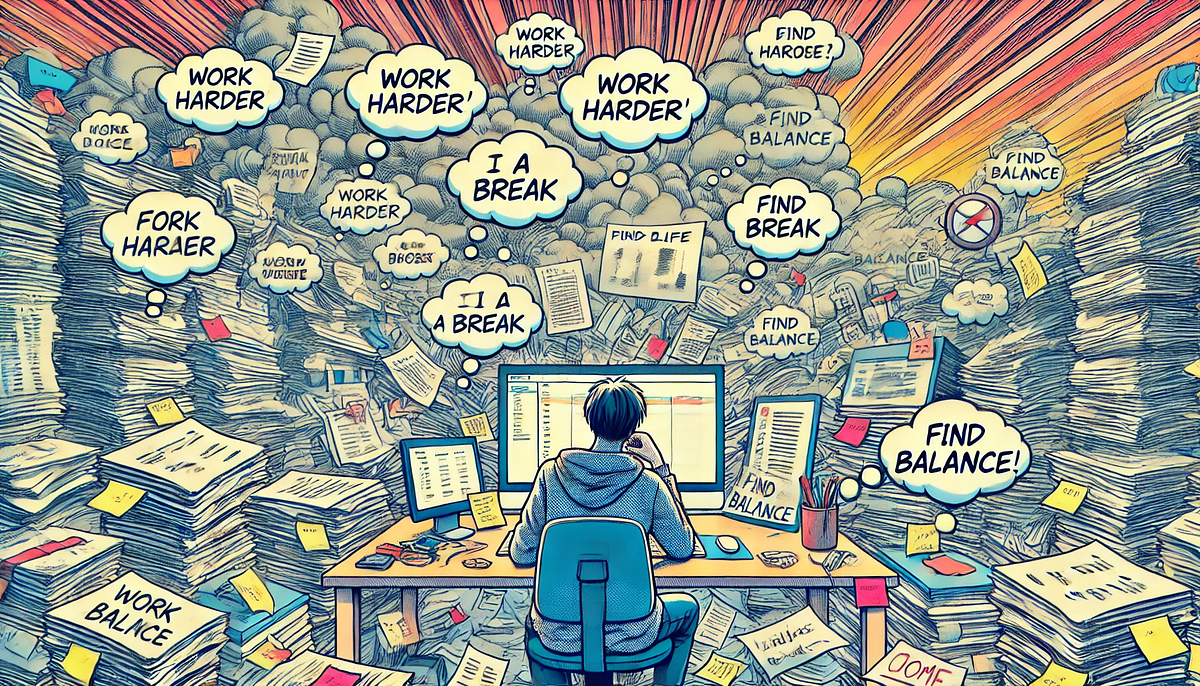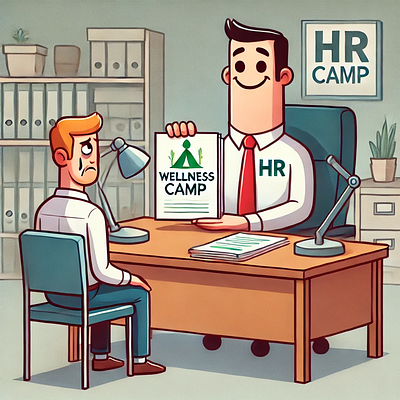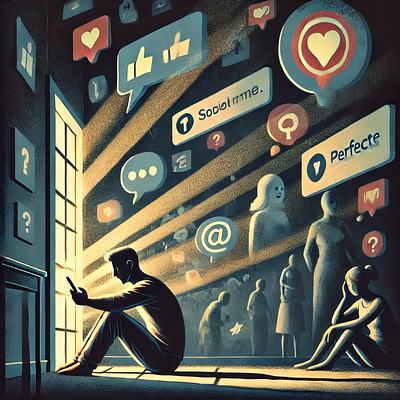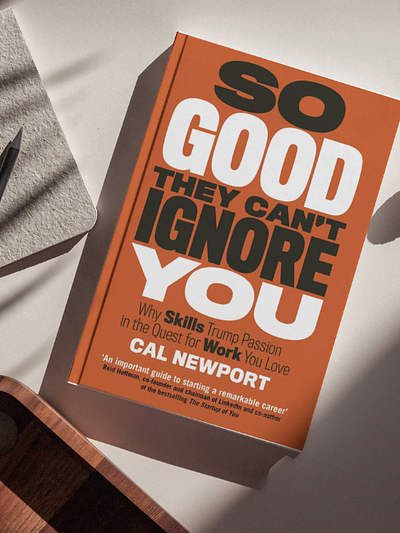Why Chasing ‘Work-Life Balance’ Is Not Worth Your Effort
Why Chasing Balance Can Be More Stressful Than Your Job — and What Actually Works.

The Hidden Costs of Chasing Harmony.
Why Chasing ‘Work-Life Balance’ Is Not Worth Your Effort
It’s roughly been a year and a half since I started my job. As a data scientist, I enjoy the work that I do. I come across different problems that can be solved manually but are the most difficult to automate. Things are fantastic. However, there was a small situation a while ago.
I pushed my first project into production. For some reason, it didn’t work as expected. One of the models I trained started giving gibberish. No solution I knew worked. I worked non-stop from Monday to Sunday to fix this error. At the week’s lowest point, I asked myself, “What am I even doing with my life?”.
Let me be honest: I love my role. Since college, I have been deeply interested in data science, and the job was the perfect avenue to learn. I always viewed my job as a part of my hobby. So, when this situation arose, I was as curious as I was frustrated. But, my curiosity dried up during the week, and my frustration increased.
Unlike the usual catharsis or relief, I felt empty when the issue was resolved. This was weird. I have worked longer on my research projects but didn’t find them stressful. Somehow, things were different in my job.
What’s the idea of this balance? I never really understood this concept. But now that I needed this balance, I wanted to get it. I did what anyone would do in my place. Google. This search directed me to multiple books, articles, videos, courses and workshops.
Over the last few weeks, I have gone through many of these sources and tried multiple bits of advice I got, from the simplest ones to the most random ones. None of them gave me a solution. It was mostly noise. Rather, I was much more stressed pursuing this “balance” than my original job.
I thought sharing what I learned over these weeks would be better. Hence, this article. Let’s start our discussion then. Where better to start our journey than the actual definition of balance?
The “simple” idea of balance.
The core idea of balance is to find one’s harmony. One’s centre of the peace so that he can lead a fulfilled life. Simple, right? No, the pitfall in this ideal is the “fulfilled life”. There is no such thing defined. It’s a matter of perception. Fulfilment for one is a stressful life for another.
Some might find fulfilment in working towards their goal, achieving something big and making a name in history. For some, it’s just having a peaceful weekend afternoon. This grey area acts as the perfect bait. The bait is so powerful that people, who are generally intelligent, fall for the traps of smart marketers.
The Noise in the search.
1. From the so-called “gurus”.
The first link that pops up when you surf through YouTube or other social media is someone coming to you and suggesting a “proven” system. They take you to this beautiful wonderland where everything is valued equally. You are comforted or, more accurately, pampered.
This makes you feel giddy for a few minutes, but soon you crave more. You will buy their books or join their course to become more gratified. Ultimately, you lose the sense of balance and are in a perpetual search to attain it. Of course, not everyone is like this, but most are. They give you some off-the-shelf solutions to make you trust them.
They make sure that this trust is built before they get you hooked.
P.S. There is, in fact, a reverse trend now. People are increasingly presenting views against the concept of balance to attract those frustrated with the earlier practices. So, don’t trust everything you see on the internet.



2. The corporate lip service.
No matter whom you ask, like your HR, your manager, etc., the common solution is to take you to the island of balance, where you are suggested their off-the-shelf wellness camps, “we value your balance” statements and other cost-effective solutions. Ultimately, this system guilt trips you into thinking the problem is within you, not the bosses or their lack of sufficient resources. Why? Getting a new, enthusiastic employee is more efficient than supporting and retaining a comfortable employee. So, when you are burnt out and take some time off or do something to reduce your load, you are called to the HR office before you have to visit many others.
3. Lack of awareness
Many people are just unaware of multiple things. We see the beautiful lives on social media and look back at our lives to find an empty, artificial void. This is something we help form in our lives. We don’t recognise when we are burnt out or stressed. We don’t know the things we truly like, things we truly hate. We are so overwhelmed by the noise in our lives that we often prefer off-the-shelf solutions that make us feel good. Unfortunately, there is no such thing that works for everyone. You can find many solutions, but ultimately, those that work for you are almost always made by you.
Looking back, all these things make up 90% of the internet. It makes you question everything you see, including this article. This questioning is where the progress starts. Ask about anything you don’t feel right. Start having discussions. Find what’s more useful to you. Then, implement them and refine them. These are a few things I found useful, and I hope you find these to be good starting points.
What helped me?
Journalling
Maintaining a journal is the common suggestion everyone gives. It is the most effective way of finding yourself. However, it’s not the time you write but the time you reflect that helps you find the deeper causes of your issues. Most of the time, the things we assume are not what we truly suffer from. Journalling is the simplest but also a time-consuming way to find your issues. I’m not going to give you any frameworks or systems. Your journal only works if you build it. Start by dumping everything on your mind; things slowly fall into place as you write and reflect.
Of course, you can follow the tips you find on the web. But, any time spent more than twenty minutes on this search is purely a waste. No matter what suggestions you get, they won’t work. Why? Journalling is personal. There is no universal system for it. No system but your own would work for you.



Passion is hard. Try something else.
With the increasing trend in the productivity market, you must have already seen this fact. It holds some truth: passion is indeed hard. But that doesn’t and, more importantly, shouldn’t mean you have to force yourself to do something you can’t enjoy. Passion/interest obviously pushes you to start something, but it almost always doesn’t sustain it. I wasted 5–6 years of my 22, thinking I would not find my passion hard or frustrating. I have started multiple things; I learned guitar, photo editing, 3-D modelling, motion graphics, you name it. Every time, I hit a point where things were not fun anymore, and every time, I just gave up, thinking it just wasn’t my passion.
On the other hand, if you find something to enjoy or a purpose for the things you do, you will always have something to look forward to. That’s the main point: things, despite hard, should have something you can hope for. You only find these from repeated analysis of what’s unique from your perspective. From math to sculpting, the fun starts only after you find what’s unique to you in the domain.
I believe that the “So Good That They Can’t Ignore You” book by Cal Newport presents this issue more practically than what I can in a few lines here. I recommend you to read the book. It’s amazing.
Communicate.
It’s an undeniable fact that humans are social animals. We grow and reflect only through communication. When someone suggests a system, ask them more about how they implement it and what they found important. Share your thoughts with actual people or through the internet. Social media is as powerful to you as it is to the marketers; use it to your advantage.
I also find walking in a nearby park and meeting people fun. I just started doing this recently, but whenever someone sits beside me on a bench, I try to find at least one interesting aspect about them. Sometimes, this starts beautiful conversations. My most memorable conversation happened similarly on a train. I had a wonderful journey, joining an interesting conversation between a lawyer and a consultant. On a different journey, I learnt much about scientific research from a 1986 PhD in BioChem, who also had experience as an assistant professor at UC Berkeley.
Speaking with someone is like opening a treasure chest; some might be empty, but the ones you find full are priceless. These findings keep your curiosity and passion alive.
P.S. I am a deep introvert, but these journeys have magic. Speaking with someone you probably would never meet again is a different experience. I didn’t know it until I was forced into a conversation one day.
Ultimately, even with all the information in the world, the only system or program that works is the one you build for yourself. No one can give you better feedback than yourself. Everything else can only help you reach your equilibrium faster. Thanks for staying till the end! I hope you found something useful in this article. Share your opinions in the responses here!
If you want to dive deeper into this discussion, I’ve added some more links down below. Explore them and share your views!
Follow for more interesting stuff! Until next time — happy reading! ✌️
Some Interesting Reads:
- Enough with the Work-Life Balance Myth — Curt Steinhorst, Forbes.
- Why Balanced work is more than just work-life balance — Samir Dave, in Mindfulness Matters, Medium.
- Why Work-Life Balance is a Myth — Dr. Laurence J. Stybel, Psychology Today.
- Is Your Burnout From Too Much Work or Too Little Impact? — Liz Wiseman, Harvard Business Review.
- 3 hard truths about work-life balance that Apple TV’s ‘Severance’ eerily illustrates — Joe Berkowitz, Fast Company
- How to start a journaling habit today — Bryan Collins, in Better Humans
Books:
- So good that they can’t ignore you — Cal Newport
- Chapter 6, The One Thing — Gary Keller, Jay Papasan
- Books recommended in this discussion on r/BettermentBookClub, Reddit.


